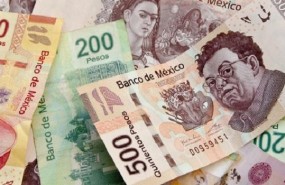
In case some chaos was missing, now it's Mexico's turn. The US president announced this morning tariffs of 5% (and that could climb up to 25%) on all Mexican goods from June 10. This measure seeks to pressure Mexico to stop immigration and assumes that the NAFTA agreement (USA, Canada and Mexico) is shaking. The European indices fell by 1% and 2% (Ibex: -2%, Cac: -1.4%, Dax: -1.7%, Ftse Mib: -1.5%, Ftse 100: -1), and the Ibex loses 9,000 points (now it has no support until 8,940).The fact that Trump had managed at the time to renegotiate and close the NAFTA agreement gave hope to many in order to reach an agreement with China. Now the uncertainty reaches unsuspected heights.
- 11.473,900
- 0,33%
Experts warn that Trump has opened a new front at the most inopportune moment, just when he is negotiating an agreement with China. They also warn that Mexico is one of the main markets to which the United States exports, which means that the measure has put US exporters "at risk". Mexico is the third largest trading partner in the US. The United States exported 265bn in goods to Mexico in 2018.
The peso has fallen by 3%, setting new annual minimums. The yen, on the other hand, has risen this morning in the middle of its role as a refuge asset.
On Friday, investors look especially close at those securities with an important presence in Mexico, such as BBVA, which fell around 4.5%. The falls in the peso and the uncertainty that is now installed around the country affects the bank as it happened in the past (for example, when Andrés Manuel López Obrador was elected president). AMLO has responded to Trump and said that "social problems are not resolved with taxes." Other banks in the Ibex also listed falls (although smaller). And in general, the European banking sector dropped 2%. In the Spanish selective, Cie leads the falls and dropped 5%. The automobile sector also loses over 2%.
All in all, Jasper Lawler, director of analysis at London Capital Group, points out that the month of May, which ends Friday, has been a "difficult" month for the markets. "Risk aversion is growing," says this expert. "They say bad news comes in threes, China confirmed that it is willing to restrict rare minerals if the trade dispute with the US intensifies further, and secondly, Chinese manufacturing activity contracted as the impact of Trump's last round of tariffs hit and, thirdly, Trump threatened to apply tariffs to Mexico if he could not control illegal immigration, "says this expert.
Thus, the European stocks accumulate significant declines this month. May will be the first month of declines for the parks of the Old Continent since it the start 2019. Specifically, the Spanish stock market fell around 6.1% and could be its worst month since the Brexit (June 2016).
Regarding the macro data of the day, the IPC of May was published in Germany and went from improving from 1% to 0.2%. The interannual figure has not been good either, going from 2% (ECB objective) to 1.4%.
TECHNICAL ANALYSIS
From a technical point of view, José María Rodríguez, an analyst at Bolsamanía, stressed that "it almost unimportant that we close this Friday over the 9,025 points, it is true that it is a level of support, but if we break it, to be with ease, with forcefulness and at the close ".
Although, rebounds aside, "the damage is already done in the sense that we have a new decreasing minimum that somehow serves to give continuity to the impeccable succession of decreasing highs and lows from mid-end of April. The case is that the doors are opened to another small short-term rebound, because if we look at the Dax, it has touched the base of the short-term bearish channel, by definition support. "
Which means "that in the very short term there are conditions to bounce back and, at least, to partially fill the bearish hole (resistance) of this Friday: in the 9,120 points, but make no mistake, it is still too soon to be able to say if we have seen the end of the corrective phase, "he adds.
For now, "the minimums of this Friday coincide approximately (8,959) with the level of adjustment / setback of 50% of the whole rise from the December minimums." The 61.8% adjustment corresponds to 8,800 points "concludes the expert.



